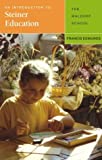Je viens de terminer la lecture d’un livre intitulé “An introduction to Steiner Education: the Waldorf School” de Francis Edmunds. La raison qui m’a poussé à le lire est que l’école maternelle que nous avons choisi pour notre fille est une école Steiner, et que je souhaitais donc approfondir le sujet.
Je ne vais pas essayer de vous résumer l’éducation selon Steiner (je vous renvoie au livre, qui est, me semble-t-il, un bon résumé), mais je voulais vous partager un passage qui m’interpelle particulièrement:I just finished reading a book entitled “An introduction to Steiner Education: the Waldorf School” by Francis Edmunds. The reason why I read it, is that the kindergarten we have chosen for our daughter happens to be a Steiner school, and I wanted to better understand the underlying thinking.
I am not going to try summarizing Steiner education here (see the book, which I think gives a fairly good overview), but I just want to share with you an excerpt of the book which I felt particularly interesting:次の本を読み終わったところです:“An introduction to Steiner Education: the Waldorf School” (作者:Francis Edmunds)。この本を読んだ主な理由は、来年から娘が入園する予定の幼稚園が「シュタイナーの学校」であって、シュタイナー教育についてもう少し調べたかったからです。
ここでシュタイナー教育をまとめるつもりはない(本を読むと大体どういうことか分かると思います)が、特に面白いと思った部分をシェアしたいと思います。
[…] Waldorf education is based on man as a threefold being. That he thinks, feels and wills, that he is head, heart and limb, is taken to be obvious. Event that he consists of body, mind […] and spirit […] is widely accepted. Yet it can hardly be said that these distinctions have entered deeply into educational practice. There the intellectual approach has grown more dominant at all levels. […]
The headwise approach, as we have called it, has serious consequences. Is the child brainy, will he be able to pass exams, are questions that weight greatly on parents. The non-exam child, the child in whom heart and limb do not keep pace with the head, comes to be looked on as inferior. Art and the crafts play second fiddle. Thus all the three phases, infant, child and adolescent, are pressed forward intellectually and this has consequence for the whole life. The clever ones are extolled, but where are the artists and the craftsmen who embellish life and give it greater quality? They are rare to find.
But the effects of overemphasis on head and brain learning go further than this. We see how children in the kindergarten lose their spontaneous genius for play. They grow restless, are bored or get uncontrolled, and then they need adults with their thought-out games and learning devices to engage and entertain them. What belongs properly to the first years of schooling is pushed down prematurely into the pre-school years. That means drawing the children into their nervous system, making them ‘heady’ too soon; but that in turn also means robbing them of their early powers of imagination, the source, if allowed to play itself out naturally, of greater creativity in later life. Then, as is seen so clearly in public life, we arrive at adults who fall short of demand, who cannot enter with imagination into the problems, mainly human problems, that confront them, and therefore cannot arrive at the needed solutions.
Personnellement, je trouve cette analyse très juste, mais je reconnais qu’elle est assez extrême et probablement source de controverse. Je serais intéressé de savoir ce que vous en pensez. Sont nos écoles trop “intellectualisantes” trop tôt, ou est-ce au contraire une évolution “normale” du 21ème siècle dans lequel nous vivons?I personally completely agree with this analysis, although I reckon it may be seen as extreme and likely controversial. But I would be really interested to know what you think about this. Are our schools indeed too “intellectualizing”, or do you think it is just a normal evolution of the 21st century in which we live?個人的に、この分析と全く賛成ですが、確かに極端で一般的に受け入れにくいと思います。あなたは、どう思いますか? 我々の学校は確かに「アタマ」にフォーカスしすぎているのか、それとも21世紀の普通の進化だと思いますか?
